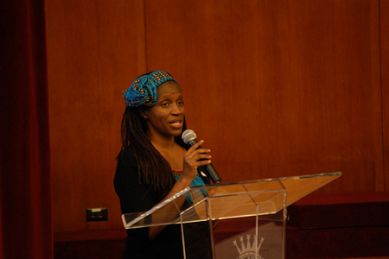Interfaith Group Launches North American Branch of Women's Network

Global interfaith group Religions for Peace (RFP) added North America to its vast Women of Faith Network this week at the close of a two-day leadership summit in New York.
Attended by nearly 100 women, the summit was held in conjunction with the 54th session of the United Nations' (U.N.) Commission on the Status of Women (CSW).
"I feel that we are building a movement… that is going to be very strategic in increasing the visibility of the leadership of women of faith in public life," Jacqueline Ogega, Director of RFP's Women's Mobilization Program, told the Ecumenical Press.
"Such a network of women of faith, when it's global, provides a forum for [women] to share their experiences and have models, and also to…see more clearly how they may be helpful in advancing development and human well being in general," she added.
The North American Women of Faith Network (NAWFN) is the fifth branch in RFP's Global Women of Faith Network (GWFN), which includes groups in Europe, Africa, Latin America and Caribbean, and Asia. A six branch in the Middle East is also being developed.
Launched in 2001 as a part of the RFP's Women's Mobilization Program, the GWFN encompasses more than 1,000 Buddhist, Christian, Hindu, Jewish, Muslim, Indigenous, Sikh and Zoroastrian religious women's organizations.
"There are women's networks in other places in the world, some that have been in place for quite some time, but to not to have one in North America was certainly a gap and this now fills out the circle," said the Rev. Karen Hamilton, general secretary for the Canadian Council of Churches (CCC)
Restoring Dignity
A major initiative in the GWFN is combating gender-based and domestic violence, a theme that was thoroughly explored in a panel session on Wednesday called "Restoring the Dignity of Women and Girls."
In a dramatic show of the prevalence of gender-based violence, guest speaker the Rev. Dr. Mary Fortune brought nearly the entire audience to their feet when she asked those who have suffered abuse or who knew someone that had to stand.
The few remaining seated she asked to stand as well, saying, "you also know someone, even if you don't know that you know."
Fortune went on to speak of how faith traditions have been historically "hijacked" as a "patriarchal glue" used to justify violence against women.
"Patriarchy justifies violence against women; violence against women upholds the patriarchy. And religion has been the glue that held all of this together for years on end," she said.
"But we are here gathered to say that no more will we allow our faith traditions to be this patriarchal glue," she declared
Ending the session with an anecdote, Fortune spoke about two tribes in West Africa and the Philippines who were oblivious to the concept of rape.
"What was interesting about those cultures is that they were cultures in which the faith leaders were both male and female and the deities of worship were both male and female, and their work was equally shared," Fortune said.
"It reminds us that [rape] is not part of the human condition – God did not create victims and victimizers," she added. "And we can go there as well."
Faith at the U.N.
Summit speakers also had words to say about the intersection of faith with the U.N. and other political organizations.
"Women of faith and women at the U.N. are looking at the same issues, but both bring particular perspectives. The CSW is an event where we can be enriched by each other, take each other seriously, and know that we're working together," said Hamilton.
Ogega noted: "Our goal is not to build a women's network that's isolated but to ensure that they're mainstreamed, not only within faith communities, but also within U.N. agencies and other civil society movements."
Along with deterring violence against women, Ogega noted several other initiatives that RFP shares with the U.N. including fighting poverty, protecting maternal health, and ending gender-based discrimination, particularly in positions of leadership.
An interfaith context
About working in an interfaith context, Ogega, a Roman Catholic, said that her eight years of experience in RFP has allowed her to "grow in her faith, understand it better, and come to respect and embrace other people in the ways that they practice their faith."
Mehrezia Labidi-Maiza of Muslim Women's Progress in France noted during the summit's opening session that "interfaith co-operation is not religions uniting against each other but religions uniting for humankind's benefit."
"Interfaith co-operation is not only a matter of mutual understanding, respect and recognition but a matter of common projects for human survival and public welfare, and struggles against drought hunger, disease, ignorance, illiteracy and under-development," she said.
Established in 1970 during a world conference in Kyoto, Japan, RFP is one of the longest standing interfaith organizations independent from a particular faith group or denomination.
Along with its women of faith initiative, the group also works in promoting just and peaceful societies, protecting the environment, and advocating on behalf of children and the youth.